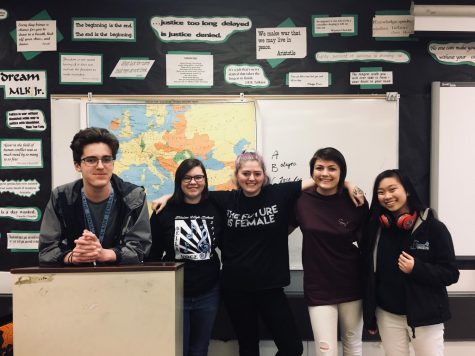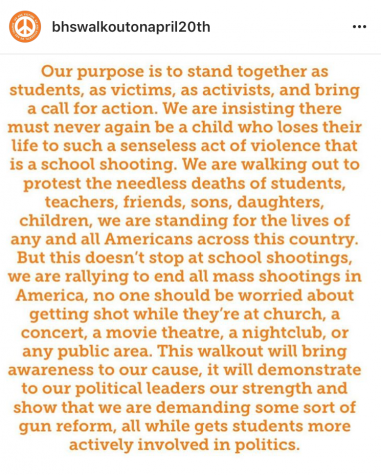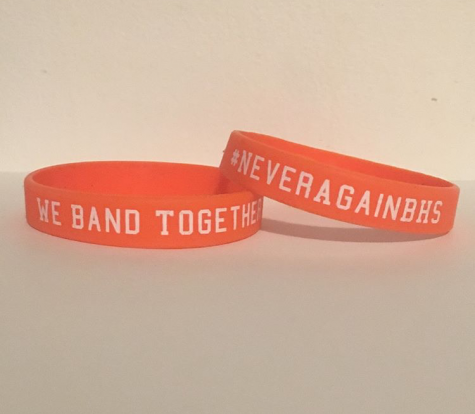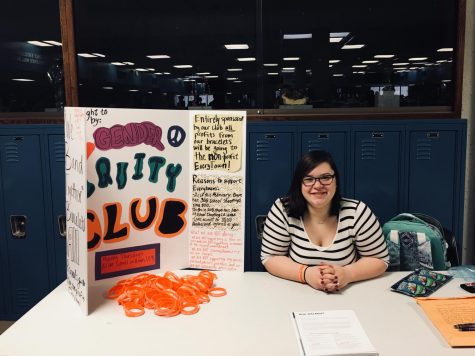Never Again
Students at Blaine High School haven’t been immune to the recent debate on gun regulation which has especially flared up in the aftermath of the Parkland shooting. Blaine, too, has had its own scares related to school shootings. Last year people will remember there were incidents of students bringing guns to school, and another when a threat was made. More recently, there was an emergency lockdown at the nearby Anoka Technical College. However, there was no active shooter.
Still, the possibility remains that Blaine might be the next school in the national headlines. During every lockdown drill, in the backs of teachers’ and students’ minds is the thought, “What if this actually happens to us?” Sophomore Emma Melin shares her reaction: “I’m sick of living in fear of going to school. I’ve started kissing my dog and saying goodbye to my family before I go to school because I’m scared I won’t come back.”
This drives the questions, Are schools in America safe enough? What measures should be taken to prevent this? and, What should we do about the guns?
To respond, high school student survivors of the Parkland shooting initiated the Never Again movement (#NeverAgain, #EnoughIsEnough) on the national scale, advocating for stricter gun control to prevent gun violence. The movement organized the nationwide demonstration, March for Our Lives on March 24, and the student activists have motivated other high school students in the nation to join the movement.

In fact, they have influenced Blaine’s Gender Equity Club, lead by Emma Melin and Faye Lewis, to lead students to participate in the National School walkout. Melin says the aim of the walkout is to unify and empower supporters of the movement at the school and in the nation. “I want that or government will hear our voices and start the wheels of change, and for young children to grow up in an influential era where they feel as though their voices matter. People can’t downplay teenager voices because we are the future.”

On Friday, April 20th, students will be walking out of class at 10:30 to gather around the school flagpole for 17 minutes, one minute to honor each of the victims of the Parkland shooting. Gender Equity Club will also have several speakers during the walkout, and there may be some local media coverage of the event.
After the walkout, 85-150 students will be heading to march on the capital. This protest is organized by Students 4 Change, but this is only for students who have registered to attend.
In accordance with district attendance policy, students will receive an unexcused absence, but parents are allowed to call in. Melin says, “We have given students fair warning about the consequence of not having parent permission… I understand that the school has to remain neutral on the topic… I’m just grateful they are allowing us to have the walkout.” The district does fully support the students’ right to assemble under the 1st.

Students at Blaine have had mixed reactions as to whether or not to participate in the national walkout. Some aren’t convinced the walkout is an effective way of pursuing change. Sophomore Ashley Mathura says, “It’s not going to change anything unless they had a goal or mission in mind specific to the school.” She adds, “There should still be gun legislation put into place. America should look to places like Norway and Japan who manage to regulate guns and as a result, have a low death rate by gun violence.”
Another Sophomore also agrees, “There is a need for legislation to increase the age limit to pay attention to mental health. I don’t oppose it because it wouldn’t affect me or hunting.”
Gavi Gunther, a junior on the Blaine Trap Shooting team says “My stance on the topic is pro-guns.” But she adamantly supports banning semi-automatic AR-15s that can be illegally converted into full automatic rifles: “There is no reason to have one, even for defense.”
“Personally, my education is important, and I wouldn’t skip classes to walk out,” says sophomore Keru Omad, reflecting the view of many students wary of leaving class and missing instruction. However, she fully supports people standing up and organizing for the cause and takes a conservative stance on the issue. “This country’s traditional beliefs are hard to change. The Founding Fathers allowed weapons to defend ourselves, under the second amendment as a fundamental right.”
Melin wants to clarify that, “Our movement isn’t about completely taking away guns it’s having some sort of reform to make everyday living much much safer.” Additionally, she said, “I’d like to encourage [conservatives] to engage with any of the gender equity members during the walkout in a peaceful conversation so we can help understand each other’s views.”

In the nation’s past, students have participated in activism before, notably protesting the Vietnam War. Blaine’s AP US History and Youth Issues teacher Ms. Towne evaluates the effectiveness of student-led movements from a historical perspective.
“For a movement to be successful, to have an impact and to get legislation passed, it needs longevity, numbers, and it must remain in the public eye for many years,” explains Towne. As an example she references of the civil rights movement, spanning decades. “Youth don’t always have the fortitude, the resilience, to fight the long battle,” she said.
She says that she has noticed that the call for gun control flares up after each shooting, but then dies down. “The Sandy Hook shooting happened in 2012, six years ago, and big legislative measures still haven’t been taken,” said Towne.
But with the new Never Again movement, there is a chance that it will become large enough so politicians would no longer be able to ignore these issues. Towne says, “Movements might start out small, but for them to become successful, they need to grow and keep passing their mission to the next generation.”
Melin is also thinking of the future and says to students: “Think about what you want the government to look like. You will be voting in the next 4-8 years. Your voice could influence other voters to join the movement and that will eventually lead to big changes in the government.”


